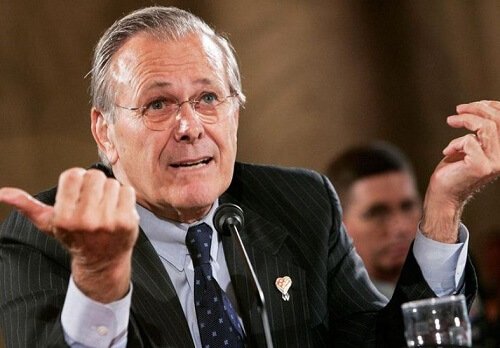In this article, here is the full details of Donald Rumsfeld about wiki, biography, date of birth, birthplace, zodiac sign, nationality, hometown, age, height, weight, father, mother, family, girlfriend, wife, relationship status, children, profession, education, career, net worth, facts, Wikipedia, and many more.

Full Name: Donald Henry Rumsfeld
Date of Birth: July 9, 1932
Place of Birth: Chicago, Illinois, USA
Date of Death: June 29, 2021
Occupation: Politician, Businessman, Author
Key Roles: U.S. Secretary of Defense (1975–1977, 2001–2006), U.S. Congressman (1963–1969), White House Chief of Staff (1974–1975)
Political Party: Republican
Early Life and Education
Donald Henry Rumsfeld was born on July 9, 1932, in Chicago, Illinois, to George and Jeannette Rumsfeld. Raised in a modest family in suburban Illinois, Rumsfeld showed an early aptitude for leadership and public service. He attended New Trier High School, where he was a standout student-athlete, excelling in wrestling.
In 1950, Rumsfeld began his undergraduate education at Princeton University on a scholarship. He graduated in 1954 with a degree in political science. During his time at Princeton, Rumsfeld continued his involvement in athletics and developed a strong interest in government and public policy, setting the foundation for his future political career.
After Princeton, Rumsfeld served as a naval aviator in the U.S. Navy from 1954 to 1957. Following his active service, he remained in the Naval Reserve, ultimately reaching the rank of captain.
Early Political Career
Rumsfeld’s career in public service began when he was elected to the U.S. House of Representatives in 1962 at the age of 30. He represented Illinois’s 13th Congressional District as a Republican and served four terms from 1963 to 1969. During his tenure in Congress, Rumsfeld was known for his strong conservative views and focus on national defense, economic issues, and civil rights legislation.
In 1969, Rumsfeld resigned from Congress to join the Nixon administration as Director of the Office of Economic Opportunity. Over the next several years, he held various high-profile positions, including U.S. Ambassador to NATO from 1973 to 1974 and Director of the Cost of Living Council. His work during this period elevated his national profile and established him as a prominent figure in Republican politics.
Secretary of Defense (First Term: 1975–1977)
Donald Rumsfeld first became U.S. Secretary of Defense under President Gerald Ford in 1975, making him the youngest person ever to hold the position at the age of 43. During his first term as Secretary of Defense, Rumsfeld played a key role in shaping U.S. military policy during the Cold War. He focused on modernizing the U.S. military, overseeing major initiatives to improve the nation’s defense capabilities.
Rumsfeld was a strong advocate for increasing defense spending, arguing that the United States needed to maintain military superiority over the Soviet Union. He also supported the development of new technologies and weapons systems, including stealth aircraft and missile defense systems.
After Ford lost the 1976 election to Jimmy Carter, Rumsfeld left the Department of Defense and entered the private sector.
Business Career
During his time away from public office, Rumsfeld built a successful career in the private sector. From 1977 to 1985, he served as CEO and president of G.D. Searle & Company, a pharmaceutical company, where he led a major turnaround that restored profitability to the company. His leadership at Searle earned him a reputation as a skilled businessman and manager.
Rumsfeld continued to serve in various corporate and advisory roles throughout the 1980s and 1990s, including as chairman and CEO of General Instrument Corporation. He also maintained his involvement in public policy as a key advisor to several Republican presidential candidates.
Secretary of Defense (Second Term: 2001–2006)
Rumsfeld returned to public service in 2001 when President George W. Bush appointed him as U.S. Secretary of Defense, marking the second time he held the position. This made Rumsfeld both the youngest and the oldest person to serve as Secretary of Defense. His second term as Defense Secretary came at a critical moment in U.S. history, as the country faced the aftermath of the September 11, 2001, terrorist attacks.
In the wake of the attacks, Rumsfeld was one of the leading architects of the U.S. military response. He oversaw the planning and execution of the U.S. invasion of Afghanistan, aimed at dismantling al-Qaeda and removing the Taliban from power. He also played a pivotal role in the lead-up to the 2003 invasion of Iraq, which aimed to overthrow Iraqi dictator Saddam Hussein.
The Iraq War became one of the most controversial aspects of Rumsfeld’s career. He was a vocal advocate for the war, arguing that Iraq possessed weapons of mass destruction (WMDs) and posed a threat to global security. However, as the war progressed and no WMDs were found, Rumsfeld faced significant criticism from both the public and members of Congress. The deteriorating security situation in Iraq, the insurgency, and the scandal at Abu Ghraib prison further damaged his reputation.
Rumsfeld’s leadership style, marked by his assertiveness and willingness to challenge the status quo, earned him both praise and criticism. He implemented military reforms aimed at modernizing the U.S. armed forces, emphasizing agility, technology, and special operations forces. However, his handling of the Iraq War and the subsequent occupation ultimately led to calls for his resignation.
In November 2006, following growing dissatisfaction with the direction of the Iraq War, Rumsfeld resigned as Secretary of Defense. His tenure had left an indelible mark on U.S. defense policy, but it also sparked debate about the long-term consequences of the wars in Afghanistan and Iraq.
Post-Political Life and Legacy
After leaving the Pentagon, Rumsfeld remained active in public life, authoring his memoir, Known and Unknown, in 2011, which provided his perspective on key events during his career. He also launched the “Rumsfeld Foundation,” a charitable organization that supports military veterans, public service, and educational programs.
Rumsfeld’s legacy is complex and multifaceted. He is widely regarded as one of the most influential defense secretaries in U.S. history, and his contributions to modernizing the U.S. military are still felt today. However, his role in the Iraq War and the controversies surrounding the conflict have also left a lasting impact on how his tenure is remembered.
In 2021, Rumsfeld passed away at the age of 88, leaving behind a legacy of public service that spanned more than five decades. His career as a congressman, diplomat, business leader, and Secretary of Defense during pivotal moments in U.S. history cemented his place as one of the most notable figures in American government.
Personal Life
Donald Rumsfeld married his high school sweetheart, Joyce Pierson, in 1954. The couple had three children together. Rumsfeld was known for his strong commitment to his family, and he often credited Joyce for supporting him throughout his long career.
Throughout his life, Rumsfeld was known for his sharp intellect, quick wit, and occasionally combative style in interviews and press conferences. His famous “Rumsfeld’s Rules” – a collection of leadership principles and observations – became widely quoted and reflected his no-nonsense approach to governance and management.
Conclusion
Donald Rumsfeld’s life and career were marked by both triumphs and controversies. His leadership in the Department of Defense during two separate eras, along with his work in the private sector, demonstrated his versatility and impact on both military and corporate America. His decisions during the Iraq War remain a subject of debate, but his influence on U.S. defense strategy and public service remains undeniable. Rumsfeld’s legacy as a key figure in shaping modern American defense policy and government will continue to be discussed for generations to come.
Stay connected with the wikimavani to know more about other trending personalities the wiki, biography, date of birth, birthplace, zodiac sign, nationality, hometown, age, height, weight, father, mother, family, boyfriend, husband, girlfriend, wife, relationship status, children, profession, education, career, net worth, facts, Wikipedia, and many more.









